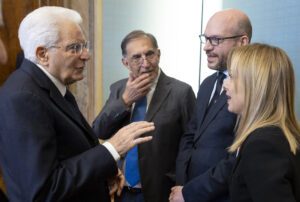First published in Spring 2023 issue of Searchlight magazine
Italian Prime Minister Giorgia Meloni’s comments on the Fosse Ardeatine massacre during the Second World War set an alarming precedent, signalling the start of a process by the far right government to recast the past, warns Alfio Bernabei

Italian President Sergio Mattarella (left), with the unwholesome trio of Ignazio La Russa (second left), Lorenzo Fontana and Giorgia Meloni
Photo: Palazzo del Quirinale
In 2016, a little-known Italian parliamentarian, Lorenzo Fontana, addressed the congress of the Greek neo-nazi party Golden Dawn that was already under investigation as a criminal organisation. Founded in the 1980s, Golden Dawn was held responsible for a string of attacks on immigrants. In 2013, one of its leading members, was accused of the murder of the celebrated rapper and anti-fascist activist Pavlos Fyssas.
Fontana, then 36 years old, was in no doubt about lending his enthusiastic support for the ‘combatants’ of a movement internationally known as one of the most dangerous neo-nazi outfits in Europe.
He said: ‘I am happy to send greetings to the friends of Golden Dawn on the occasion of their congress. At this difficult time for Europe your contribution will be decisive. Europe cannot do without Greece. Greece is the beacon of that classical Europe that we all love and the one we want to see reborn from its ashes. It is a difficult moment, we need to fight. I know that you are combatants and together with us I am certain that we will relaunch this Europe and return her as a beacon of civilisation. Greetings to all.’
Fontana’s remark, ‘together with us’, must have been intended as a pledge of solidarity and co-operation with the Italian party to which he belonged and of which he is still a member – the League – formerly called the Northern League (La Lega). He joined the youth wing of the party as a student, before graduating in political science at Padua University and in philosophy at the Pontifical University St Thomas Aquinas in Rome.
After being elected to the Verona city council, in 2009 he was elected to the European Parliament. This role was renewed at the 2014 European Parliament election and in 2016 he was appointed by Matteo Salvini, leader of the League, as the party’s deputy federal secretary.
Political earthquake
Fontana’s name has been barely mentioned in the British press, but in Italy his career has blossomed. Today, he is the President of the Italian Chamber of Deputies, the equivalent of the House of Commons in the UK. He was elected to this position following last year’s general election that resulted in Giorgia Meloni, leader of the far-right Brothers of Italy (Fratelli d’Italia), becoming the country’s prime minister.
Fontana is currently properly described as the politician who holds the third highest ranking office of the Italian Republic, after Meloni and the President of the Senate, Ignazio La Russa.
It is when the role of Fontana with his political background is given its proper place in the ranking order of who holds power in Italy that the threat posed by the trio of Meloni–La Russa–Fontana can be seen in its full significance, highlighting the political earthquake that struck the country with the results of the 2022 election that landed Italy with its most right-wing government since the Second World War.
Meloni was only 15 when she joined the youth wing of the neofascist Movimento Sociale Italiano, inheritor of Mussolini’s fascist party that was set up during the Second World War to support the puppet government of the Salò Republic under the control of the Third Reich.
La Russa, a member of the Meloni-led Brothers of Italy party, has candidly admitted his love for fascist memorabilia. He found it perfectly normal to keep a bust of Hitler’s ally, Mussolini, at his house.
The political results of this trio in charge of key institutions will manifest in due course through administrative and legislative matters, but one of the consequences that is already clear is in the realm of culture. The process of rewriting history has begun – on a scale that surpasses anything that happened since Silvio Berlusconi’s first victory of 1994, which brought into government the racist Northern League with the Alleanza Nazionale party led by Gianfranco Fini, formerly secretary of the post-fascist Movimento Sociale Italiano.
Atrocities
An illustration of how history is being rewritten is the uproar that occurred in March during commemoration of the 79th anniversary of the Fosse Ardeatine massacre, one of the worst atrocities committed by the Nazi-fascists in Italy during the Second World War.
On 24 March 1944, 335 men, including Italian soldiers, civilians, political prisoners, Jews and common detainees were rounded up, killed and buried in a cave in Rome as an act of reprisal following an attack by partisans on Via Rasella that had caused the death of 33 Nazis. The partisans had placed explosives that were detonated when a formation of armed members of the Polizie Regiment ‘Bozen’ entered the street.
The head of the Gestapo in Rome, Herbert Kappler, immediately enacted instructions from Hitler that ten Italians should be executed for every German victim. The hurried selection of those to be killed was completed with the assistance of Italian fascist members of the police and of Mussolini’s Salò Republic puppet government. Prominent on their list were anti-fascist politicians, members of the partisan brigades and 73 Jews.
It was Meloni’s choice of words in her message of commemoration of the massacre that caused alarm among anti fascist organisations. She said that the victims were executed ‘because they were Italians’, as if the list had been compiled on the basis of nationality alone.
Gianfranco Pagliarulo, president of the National Association of Partisans, the ANPI, was quick to respond. ‘The Prime Minister Meloni does not remember everything. She said that the 335 martyrs of the Ardeatine Caves were killed ‘only because they were Italians’. It is important to be more precise: certainly, they were Italians, but they were chosen for execution on the basis of a selection that was aimed at anti fascists, partisans, political opponents and Jews.
‘It is necessary to add that the list of some of those who were massacred by the Nazis was compiled with the complicity of the Italian fascist police superintendent Pietro Caruso and the Home Secretary of Mussolini’s Salò Republic Guido Buffarini Guidi, as well as that of the war criminal Pietro Koch, all of them fascists.’
Giorgio La Malfa, Secretary of the Republican Party, was more direct: ‘Meloni is exhibiting the cultural inheritance of Giorgio Almirante, former leader of the [fascist party] Movimento Sociale Italiano. Her words are aimed at watering down differences [between fascists and anti-fascists].
Nicola Fratoianni, secretary of the left-wing party, Sinistra Italiana, asked: ‘Will the day ever come when Meloni will be able to write that word: anti-fascist?’
More indignation was caused by La Russa when he commented, jokingly, that, far from deserving to be considered an act of noble resistance to Nazi-fascism, the partisans’ attack had been baseless and dishonourable because it had killed only ‘old-age pensioners, members of a music band’.
He sought to further denigrate the resistance movement by adding that the partisans must have been aware there would be some sort of retaliation. Later, he was forced to apologise ‘for any offence caused’, but his aim was the same as Meloni’s revisionist attempt to rewrite history and avoid calling the massacre of 335 men, some children, and Jews, what it was: an execution perpetrated with the assistance of Italian fascists following Mussolini’s alliance with Hitler.
Revisionist language
Commenting on La Russa’s belittling and distortion of the events, the writer Edith Bruck, a survivor of the Holocaust remarked: ‘Such words are the more serious, given that they come from a representative of government institutions.’
When Meloni finally responded to the criticism provoked by La Russa’s comments, it was only to make things worse by showing that she was not too worried by false statements about the resistance movement. In her opinion, the President of the Senate had only trampled on language and committed a sgrammaticatura, the term that might be used to comment on a grammatical mistake by a school pupil, nothing to worry about.
It is through language astutely used that historical revisionism operates. This old stratagem is becoming an instrument of influence guided by the top representatives of the most important institutions in Italy.
It is a dangerous exercise that does not bode well for the country that invented fascism and never completely rid itself of it. Italy now finds itself landed with a prime minister who only last year, when asked to drop the fascist symbol – the flame – from the logo of the party she represents, simply turned a deaf ear to all appeals.





